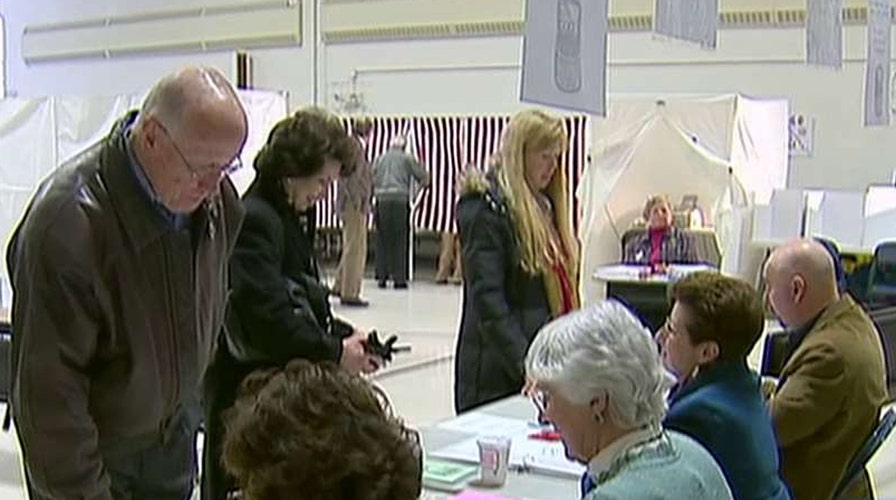New Hampshire’s first-in-the-nation presidential primary makes history every four years, and on Feb. 9 it will do so for an additional reason.
This year, for the first time, primary voters will have to show ID.
"I think there are definitely going to be lines, with any indication of our absentee balloting already -- it’s huge," said Kerri Parker, the town clerk of Meredith, N.H., and president of the New Hampshire Town and City Clerks Association.
"People are concerned, they want to get out, they want their voice to be heard, which is great," she said, but cautioned that "the only thing they need to remember is to bring their ID's to the polls. … We have to see your ID because of voter fraud."
Tens of thousands of new voters are expected to flood the polls, and they will need to show up with a valid photo ID, which can include a driver’s license, passport, military ID, and even some student ID's from colleges and schools approved by the state.
The requirement was first implemented in the 2012 general election, and even though officials say there have been few cases of voter fraud, illegal voting has occurred.
Lorin Schneider, Jr., who lives in Massachusetts, pleaded guilty to wrongful voting charges for illegally voting in New Hampshire three times. He cast his ballots in the 2008 presidential election and again in both the presidential primary and general election in 2012. He was fined roughly $7,000, given a suspended prison term and lost his right to vote in the state.
This month, Manchester resident Derek Castonguay also pleaded guilty to voter fraud after prosecutors say he voted illegally and tried to vote twice during the mid-term election in 2014. He also was given a suspended jail term and fined $1,000.
The controversial issue of voter fraud also has been injected into the 2016 presidential race.
"Voter fraud, look. You have to have real security with the voting system. This voting system is out of control," Donald Trump charged during an appearance on Jan. 5 in Claremont, N.H. "You have people, in my opinion, that are voting many, many times. They don't want security, they don't want cards."
"I don't have any reason to believe there is rampant voter fraud," countered New Hampshire's long-serving Secretary of State Bill Gardner, who is overseeing the use of voter ID. While he says it "has worked very well," he also acknowledges there have been some instances of voter fraud in his state.
"It happens. We know that it happens, because we have the records that it happened. But that was all part of how people tried to come together to come up with a process that protects it as much as we can ... you're never going to eliminate attempts to abuse the process," he said.
"It's not impossible, but we've made it very, very difficult to successfully be able to commit fraud."
Voters who show up at the polls without ID will still be able to vote, but will have to sign an affidavit attesting that they are who they say they are. Then election officials will take the voter's photograph with an instant camera, and attach the photo to the affidavit. The state spent $15,000 buying 320 cameras for local boards of elections.
Gardner wanted to ensure no voter would be turned away from a polling place without being able to vote. But opponents of voter ID also chafe at the photo requirement.
"Some people can be very sensitive to having their photo taken especially when it is taken by an official, for an official purpose," said Devon Chaffee, executive director of the American Civil Liberties Union of New Hampshire, who believes that voter ID adds an unfair burden and obstacle to voting, especially for the elderly and minorities.
Chaffee told Fox News she fears the affidavit process, and photography, will also add to the administrative process of voting and make the expected lines even longer.
"This will take even additional time and resources for the polling officials and we are concerned that that might also result in increasing lines," she said.
Gardner told Fox News that no voter has been denied the right to vote because of voter ID, and he is confident election officials will be prepared.
"The number of people that have shown up at the polls without any identification is much smaller than almost anyone thought. During the debate on the issue, there were some who believed that 10 to 11 percent of the population would be affected by this, the other side thought it would only be 1 percent, and it has ended up less than one-half of 1 percent, so it has been a much smaller number."
Parker said she, and her fellow election officials, are ready for any possible cheaters.
"If somebody really wants to do that and they think that that's important I think somebody will eventually figure out a way,” she said. “But in the state of New Hampshire, I am pretty confident that we are good at what we do."
Follow Eric Shawn on Twitter: @ERICSHAWNONFOX
Fox News' Whitney Ksiazek contributed to this report.





